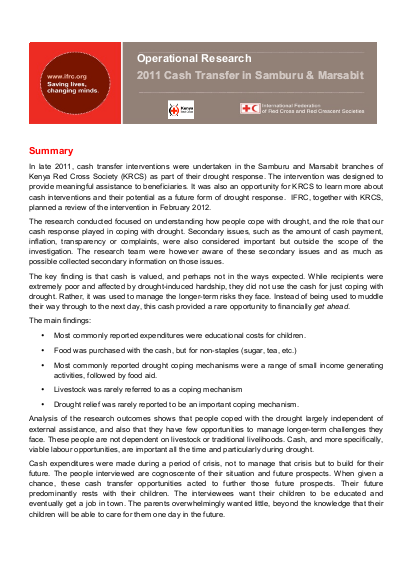Operational Research

In late 2011, cash transfer interventions were undertaken in the Samburu and Marsabit branches of Kenya Red Cross Society (KRCS) as part of their drought response. The intervention was designed to provide meaningful assistance to beneficiaries. It was also an opportunity for KRCS to learn more about cash interventions and their potential as a future form of drought response. IFRC, together with KRCS, planned a review of the intervention in February 2012. The research conducted focused on understanding how people cope with drought, and the role that our cash response played in coping with drought. Secondary issues, such as the amount of cash payment, inflation, transparency or complaints, were also considered important but outside the scope of the investigation. The research team were however aware of these secondary issues and as much as possible collected secondary information on those issues. The key finding is that cash is valued, and perhaps not in the ways expected. While recipients were extremely poor and affected by drought-induced hardship, they did not use the cash for just coping with drought. Rather, it was used to manage the longer-term risks they face. Instead of being used to muddle their way through to the next day, this cash provided a rare opportunity to financially get ahead. The main findings: • Most commonly reported expenditures were educational costs for children. • Food was purchased with the cash, but for non-staples (sugar, tea, etc.) • Most commonly reported drought coping mechanisms were a range of small income generating activities, followed by food aid. • Livestock was rarely referred to as a coping mechanism • Drought relief was rarely reported to be an important coping mechanism.